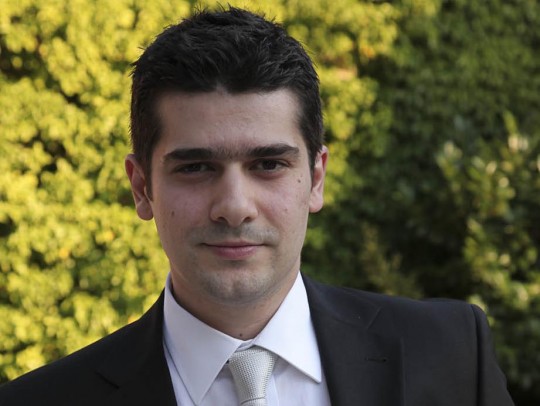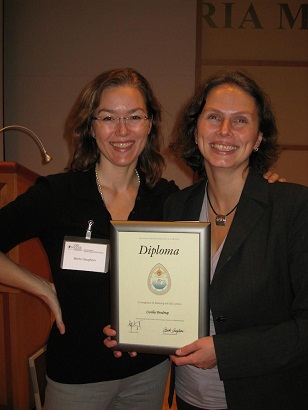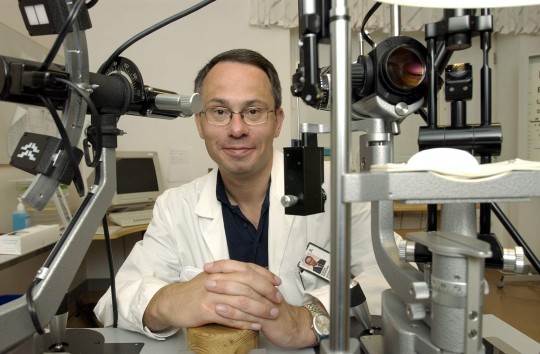Interviews
Experiences
Alja Crnej is a young Slovenian ophthalmologist who has carried out successful clinical and research fellowships in Europe and USA. To find out her experiences and advice on how to obtain first-class international ophthalmic training independently click here
Petros Petrou Interview on his current position as a vitreo-retinal fellow at Moorfields Eye Hospital.
How and why will this fellowship help you in your career goals?
Ophthalmology has evolved in a way that subspecialisation is almost essential for career development. A fellowship represents the only official way for obtaining a subspecialisation in ophthalmology.
Personally, my career goal was to sub specialize in Vitreoretinal surgery and the fellowship was the only way to gain the clinical and surgical experience required in order to become an independent vitreoretinal surgeon.
What are the expectations of a fellow?
A fellowship’s duration is limited and therefore the fellow should be prepared to work hard in order to make the most of it. Of course, the final expectations are primarily surgical and clinical proficiency at the end of the fellowship. Also, it is advisable to be involved in research and produce scientific results.
The fellowship will guide you towards your future professional development and it is important to be productive and have a keenness and aptitude for learning.
Are fellowships funded?
Yes, fellowships are paid posts and the level of salary depends on the hospital and the individual’s experience. Therefore, the salary varies and this information is provided when the post is advertised.
What is the typical length of a fellowship?
In the UK typically a fellowship’s contract is for one year. Of course, according to the type of the chosen subspecialty as well as the fellow’s goals and personal status, one may choose to renew their contract or to apply for a fellowship in a different unit in order to gain further experience.
Typically, during the first year the fellow learns how to manage primary disease (e.g retinal detachment) and during the second year he or she would gain experience in managing complex cases (such as diabetic tractional detachments), secondary cases and tertiary referrals.
How is the fellowship different to your previous job? What are the benefits?
When you become a fellow, the level of responsibility increases. The fellow will be at the receiving end of enquiries about cases that require complex and challenging subspecialty management. In addition, as a fellow you become much more active surgically and you are required to supervise juniors and manage complications.
Therefore, the learning curve for a new fellow is very steep from the beginning of the training. Although that this process can be relatively stressful initially, it soon becomes a very interesting and pleasant experience in the effort to expand the clinical and surgical skills.
How competitive is it to get fellowships?
It depends on the subspecialty. For example, traditionally corneal and vitreoretinal fellowships are the most competitive. You may have to apply more than once and should not take it personally if you get rejected.
How to prepare for a fellowship?
Fundamental, clinical and surgical skills and knowledge of disease and natural history for the specific sub-specialty is important. In addition, the applicant should try to be updated in terms of literature evidence.
A pursue of continuous personal and scientific development towards the chosen subspecialty is important to start some years before the application. So, courses, surgical experience, publications, teaching and audit experience should enrich one’s CV to increase the chances of securing a place in the fellowship.
Do you need to pass any exams to get a fellowship and do you get any kind of a qualification / certificate when fellowship is completed?
Most fellowships in the UK require MRCOphth or equivalent. Also, some units advertise “post CCST” fellowships, so a certificate of completion of training in ophthalmology (or the equivalent from European countries) is required.
Of course, for international fellows from other European countries, acquiring general medical council registration is a pre-requisite.
Some units (but not all) provide a certificate upon completion of the fellowship.
Who is eligible to apply for fellowships and can I apply for multiple fellowships?
Everybody with MRCOphth or equivalent and/or CCST and GMC registration can apply for a fellowship provided that the immigration status permits work in the United Kingdom.
One can apply for multiple fellowships, but each one represents a separate application. There is no matching scheme in the UK.
Where can I find out more about different fellowship offerings? How do I apply for a fellowship?
In the UK, most fellowship posts are formally advertised in the two major websites:
https://www.jobs.nhs.uk/ and http://careers.bmj.com/careers/hospital-medical-healthcare-doctors-jobs.html.
In order to apply for a fellowship one needs to fill in the application form provided via the two major websites. Through the application form the employer will gather information related to clinical, surgical, research and audit experience. In addition, information about the applicant’s character, ethos, competence and goals will be gathered and the applicant will need to provide names of 3-5 referees who will be contacted after the interview process.
Sometimes, in addition to the completed application form, a CV should be attached. In most cases the application form is submitted via the https://www.jobs.nhs.uk/.
How far in advance should I start applying for a fellowship?
It depends on the needs of each hospital specified in the advertised post. So, sometimes hospitals advertise a fellowship opportunity one or two years in advance and some others may need the successful applicant to begin as soon as possible or within months from the time of the interview.
What is needed to apply for a fellowship? What are the most important parts of the application process?
In order to apply for a fellowship one needs to fill in the application form provided via the two major websites previously mentioned. Through the application form the employer will gather information related to clinical, surgical, research and audit experience. In addition, information about the applicant’s character, ethos, competence and goals will be gathered and the applicant will need to provide names of 3-5 referees who will be contacted after the interview process.
For fellowships that are predominately surgical, it is crucial to provide a surgical logbook (ie give numbers, outcomes and type of procedures performed during training). Similarly, the detailed report of performed laser procedures is very important for e.g medical retina fellowship.
Also, it is important to provide evidence of teaching, audit, courses attended and research related to the subspecialty.
Visiting the department and showing interest for the position in advance usually increases the chances of securing a place on the fellowship.
What are some examples of issues you faced to get a fellowship?
When one applies for the first fellowship, the subspecialty experience (clinical and surgical) can be limited. Therefore, being successful in getting your first fellowship position can be challenging and psychologically intense. It is very important that applicants persist in achieving their goals even after multiple rejections.
Give an example of a great case you’ve recently been involved with.
I had the pleasure to work in a major hospital that is a worldwide tertiary referral centre. Therefore, it is frequent to be involved in the management of complex and rare cases. The most recent one was a case of a patient with Boston keratoprosthesis who developed a complex PVR retinal detachment with associated choroidal effusion requiring vitrectomy. Performing a vitrectomy in these cases is not well documented in the literature and the intraocular technical aspects of it as well as the post-operative results and prognosis can be “new territory” for a VR surgeon. Despite the rarity of these cases, this is the fifth case I have been involved in and I consider myself very fortunate that I had this opportunity during my time as a vitreoretinal fellow.
Interview with Bente Haughom MD, Oslo Norway
Bente practices at a small private practice and the Institute of Aviation Medicine in Oslo located at the University in Oslo, Norway
What made you decide to become an ophthalmologist?
There was never really any other field that seemed quite as appealing, although a brief period of neurology was interesting, too.
If you were to think of another career instead of ophthalmology, what would it be?
It would have to include some kind of surgery, I think, and ENT would probably be the best guess. Although, keeping the great advances in radiology in mind, this could also have been a good option.
Which ophthalmological meeting is in your opinion of greatest importance in YO education?
Honestly, the SOE meetings have been the best meeting for me ever since I was in Madrid, for my first SOE meeting. All of ophthalmology is covered, but it is smaller scale than the really large meetings, which makes it easier to get from one session to another. I also think the cooperation between AAO and SOE has improved the quality of the meeting.
Would you like to see more space for YO´s to present at the SOE?
I think this is something we should discuss, seeing how popular the YO symposia have become. And looking at the audience, obviously, many older colleagues (like me) are attending these sessions with great interest.
What do you see as a next big breakthrough in ophthalmology (cataract, keratoplasty, retina…)
Looking into the future is difficult, of course, but I hope a breakthrough at some point will involve treating preventable blindness in underprivileged areas. Besides this, I think more focus will be on prevention in years to come. We will also probably have even more focus on optimizing visual function, than we already have today.
How do you balance between professional and private life?
It can be difficult. If I should give an advice, it would be to have other interests, and have family and friends high on the priority list.
If you have taken part in the EuLDP program what were the highlights of your experience.
To meet colleagues and have formal and informal discussions is really the best way to learn about ophthalmology in a bigger perspective than we can get at home. And the setting involves other parts of our professional life, subjects that are not discussed at the conventional conferences. Coming from a small country, this experience really was important to me.
What’s the best piece of advice you’ve gotten in your career so far?
Find something you can be good at. Even early in your career, you can choose a small subject, study some articles and maybe even send in a case history to a journal.
What advice would you give a resident or someone considering ophthalmology as a specialty?
First of all: Just do it! It gives you more choices than you think. You can work as a surgeon, a medical doctor, in a private or public setting, with volunteering, occupational medicine or in academia.
And when you are there: Find a forum; discuss cases and patients with your colleagues, even though this can expose the fact that you have not given them the optimal treatment all the time. If you experience complications, don’t leave the patients alone with all the questions, but keep an open door to these patients and try to explain to them why it happened.
It’s also important to see different ways of treating patients; maybe work in different settings or take some time to visit other departments (this is also one reason why the Norwegian Ophthalmological Society has twinned with the Minnesota society).
Interview with Stefan Seregard, MD, PhD
President, European Society of Ophthalmology (SOE)
President, European Society of Ophthalmic Pathology (EOPS)
Professor of Ophthalmology, Department of Clinical Neuroscience, Karolinska Institutet, Sweden
Chairman, Department of Vitreoretinal Diseases, St Eriks Eye Hospital, Stockholm, Sweden
What made you decide to become an ophthalmologist?
I think it was the way diagnosis in ophthalmology is obtained. Basically, your diagnosis is based on what you see with your eye. It is still largely like this, although we now have many instruments and devices that assist you in making the correct diagnosis. Notably, ophthalmologists still rarely need the help of other medical specialists.
Who was the person that influenced you most in the early days of your career?
I think you pick up bits and pieces as you go along. You take the parts you like best from whichever leadership programme you attend, whatever book you read or whoever you meet who inspires you. I would like to mention two names in particular from my early career in ophthalmology. Firstly, Professor Björn Tengroth who made me realise that if you get the overall picture right, the details will come later. On the other hand, the details makeup the overall picture so it is always a balance. Secondly, Professor Bo Philipson who has an outstanding talent for making people have fun as they work. This is an excellent way to encourage and entice young residents (and senior consultants too) to make their best and continue beyond what they thought would be possible.
What did you find most challenging as a young ophthalmologist?
The most daunting task in my early career was probably when I read the three volume state-of-the-art textbook by Peyman. This was made as an attempt to grasp all of ophthalmology, however I soon realized that not only was the textbook incomplete it was also partly outdated. Alas, this is the fate of any textbook.
What were the highlights of your experience on the EuLDP program?
I think anyone participating in the EuLDP program appreciates the possibility to meet with other ophthalmologist in similar programs across the world and to interact with them in informal networks. I will also like to mention that as the founder of the EuLDP programme, I probably felt the most satisfaction when I could handover the running of the programme to the current director, Professor Nikos Becharakis rest assured that the programme would continue to develop even further without me being around.
If you were to think of another career instead of ophthalmology, what would it be?
The answer to this question is simple and straightforward. As an ophthalmic pathologist and being both certified in both ophthalmology and surgical pathology the answer is that if I would not have become an ophthalmologist, I would most likely have ended as a pathologist. Both of these specialties are image-based.
What qualities do you try to transfer to your residents/fellows?
Naturally, there are numerous qualities that you want to transfer to your juniors. However if I was to mention one quality only, it would be to enjoy yourself and have fun while working. If you can keep this up and keep your curiosity focused you are likely to do great work. If you are bored you will simply not succeed.
SOE differs to other large ophthalmological organization – could you explain the details?
Firstly the SOE is only constrained by the European geographical borders, i.e. the SOE includes national societies both within the EU-region and beyond as long as it is within geographical Europe. Actually we have associated members in Jordan, Israel and Egypt well outside of geographical Europe. Secondly, the SOE is actually a federation of national ophthalmological societies. The SOE does not have an individual membership unlike many other organisations.
Would you like to see more space for YO´s to present at the SOE.
Absolutely, we are already bringing in talented young ophthalmologists, often lauded as SOE lectures and students or graduates from the EuLDP programme.
Which ophthalmological meeting is in your opinion of greatest importance in YO education?
The beauty of European ophthalmology is that there is not anyone meeting that is singularly important. I am biased when I mention the European Society of Ophthalmology (SOE) for its outstanding sessions that we try to get close to the cutting edge. However, I could equally well mention EUPO for its great work in producing residency courses or EVER for being an outstanding scientific society.
Stefan Seregard November 2012



